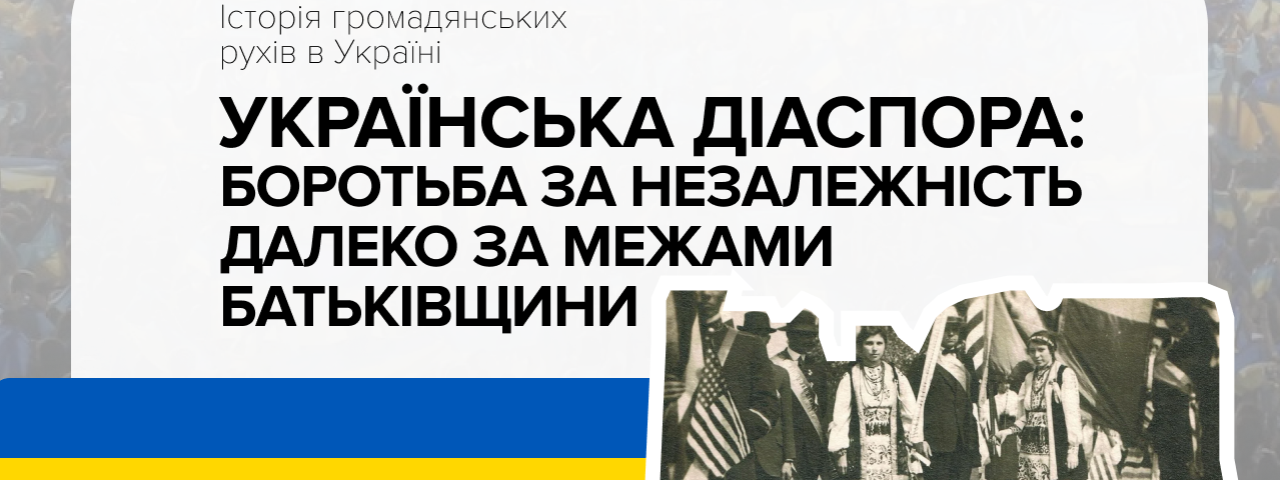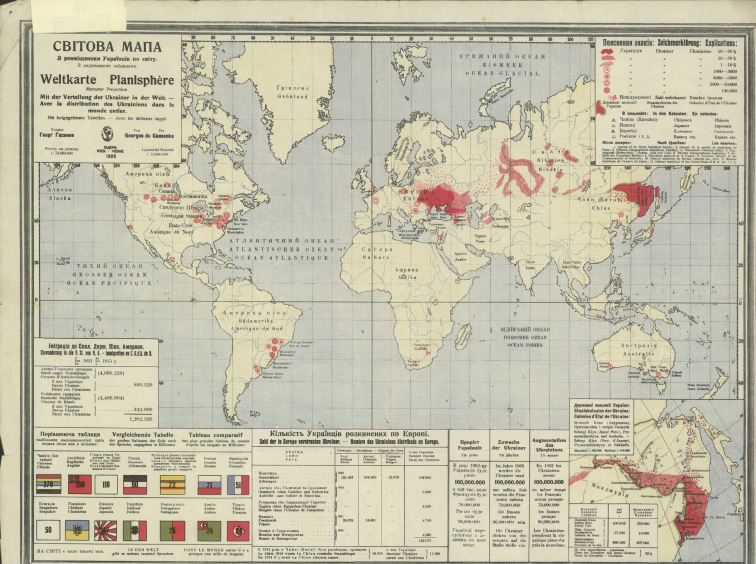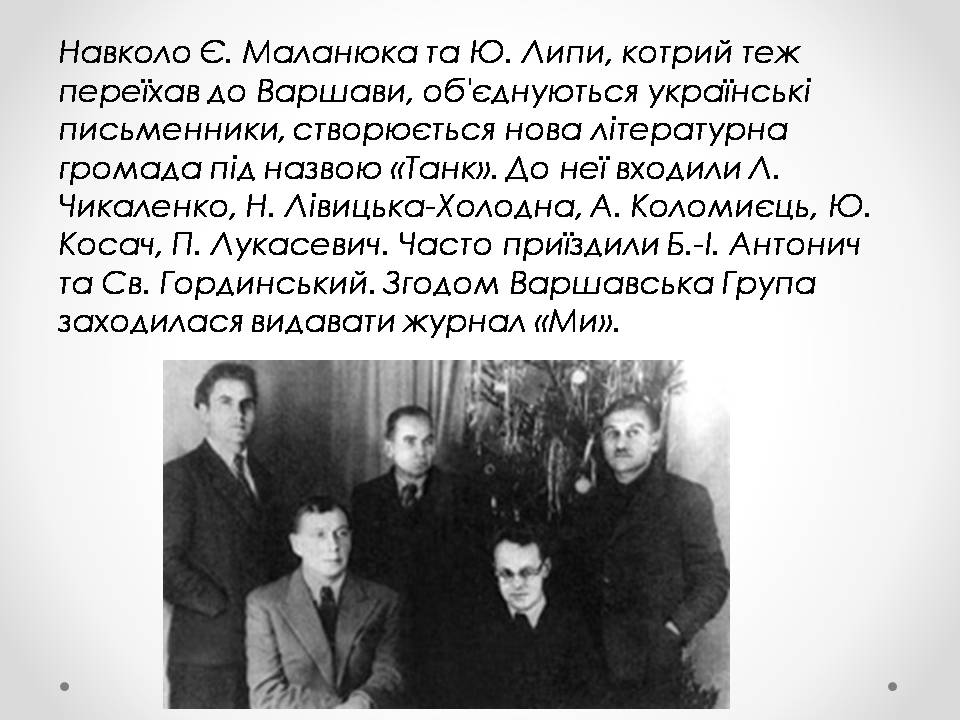The Ukrainian diaspora: the fight for independence far beyond the borders of the Motherland

The Act of Declaration of Independence was preceded by centuries of hard fighting to preserve identity, language, culture, and the right to be called Ukrainian. The Ukrainian diaspora fought for the embodiment of the national idea at a time when the pressure of the Soviet government was becoming almost unbearable, when activists and cultural figures were being killed by the dozens and there was almost no opportunity for the development of national consciousness in the Motherland.
From an inexperienced point of view, it may seem that Ukraine's independence came organically and seamlessly with the collapse of the USSR. However, the signing of the Act of Independence was preceded by centuries of hard struggle to save our identity, language, culture and the right to be called Ukrainian. And at a time when the pressure of the Soviet government was becoming almost unbearable, when activists and cultural figures were being killed by the dozens, the Ukrainian diaspora fought for the realisation of the national idea.
From the late XIX century to the 1950s, millions of Ukrainians left their homes for political and economic reasons. The largest Ukrainian diasporas were formed in Canada, the United States, and Europe. They preserved their culture and developed it abroad. At a time when the Ukrainian language and culture were increasingly oppressed in the Soviet Union and Ukrainian intellectuals were repressed, the diaspora preserved its identity. In various ways, from cultural development to political action, Ukrainian emigrants supported the movement for Ukrainian independence.
One of the well-known representatives of the diaspora, Yevhen Malaniuk, in his article "On the Role of Emigration" accurately and succinctly outlined the main task of the Ukrainian diaspora, which should be "a representative of the Ukrainian liberation fight abroad."

Preserving national identity
The majority of Ukrainians who went abroad remained loyal to their culture and tried to develop it in every possible way. Thanks to the efforts of the first wave of emigrants, Ukrainian newspapers were published, Ukrainian cultural centres, schools, reading churches, and "Prosvita" appeared outside our homeland in the late XIX and early XX centuries.
Perhaps the most important factor in preserving national identity is the language. Therefore, the diaspora made considerable efforts to promote the Ukrainian language and literature.
Ukrainian educational and scientific institutions and organisations specialising in the preservation of their heritage began to appear in all emigration centres. There are hundreds of such institutions around the world. Among them are the Ukrainian Free University in Vienna, founded by Hrushevsky and Dnistriansky, as well as the Ukrainian Gymnasium in Prague, the Taras Shevchenko Society in Munich, and numerous Ukrainian language departments that were established at universities in Slovakia and Poland. The Canadian Institute of Ukrainian Studies, founded in Edmonton in 1976 at the University of Alberta, became the centre of Ukrainian studies outside Ukraine. The institute's task was to preserve Ukrainian identity — to assert that the Ukrainian language, history and culture have their own value.
In addition, Ukrainian publishing houses functioned and Ukrainian periodicals were distributed. In 1886, one of the first Ukrainian-language magazines, "America", was published in the United States. Later, many newspapers were published around the world, including in Canada, Austria, Germany, Belgium, France, the United Kingdom, Czechoslovakia, Poland, Romania, and many other countries.
Literature was also actively developing. The first significant Ukrainian literary associations appeared in the 1920s. They included, first of all, the Prague School, which consisted mainly of artists who, after the defeat of the Ukrainian liberation struggle in 1917-1922, were forced or willing to go abroad and settle in various European cities. Among them were Yurii Lypa, Yurii Klen, Oleh Olzhych, Olena Teliha, Yevhen Malaniuk, Natalia Livytska-Kholodna, and other artists.
Subsequently, the association called "Tank"appeared in Poland, which later reformatted into "We". The members managed to organise the publishing of their works and the periodical of the same name. This association played a significant role in spreading Ukrainian literature in Poland before the Second World War.

The founding of literary societies contributed to the communication of Ukrainian authors, the establishment of publishing activities, and gave impetus to the development of Ukrainian writers and literary criticism. Thanks to the diaspora, the works of Ukrainian dissidents who were not published in the Soviet Union were published abroad, including the literary achievements of Sviatoslav Karavatsky and Viktor Borovsky.
It was the diaspora that continued to work on the cultural processes that began in Ukraine in the early twentieth century but were unable to develop due to the oppression of the Soviet government.
Ukrainians abroad managed to preserve their culture and remain true to their national ideas. And it was their art works and scholarly works that educated future representatives of the struggle for Ukrainian independence.
Countering Soviet propaganda
After the Second World War, many Ukrainians ended up abroad. The USSR demanded that the Allies return all of their citizens, but not all refugees wanted to return home — many of them were only waiting for imprisonment and repression. That is why conscious intellectuals remained in the West, renewing their efforts to oppose Soviet propaganda and promote the idea of an independent Ukraine.
The diaspora waged its own information and agitation war. They organised demonstrations with posters dedicated to Ukraine, created Ukrainian TV programmes, and printed leaflets with true information about human rights violations in Ukraine and the arrests of dissidents.
Ukrainians tried to attract public attention at major global events. A well-known case is that which took place during the World Exhibition of Scientific and Cultural Achievements in 1967. While individual US states had their own pavilions at the exhibition, the Soviet Union as a whole, but not the Ukrainian SSR, was represented by the USSR. The diaspora began to protest: they appealed to municipalities, local communities, officials, and the UN. The Canadian government did offer to create a pavilion for the Ukrainian SSR, as the republic was already a member of the UN at the time, but the Soviet Union refused.
Then the Ukrainians began to print and distribute leaflets with information about the crimes of the communist regime, and to hang Ukrainian flags near the pavilion. They even printed fake brochures allegedly on behalf of the First Deputy Chairman of the USSR Council of Ministers, Dmitry Polyansky, in which it was written that as a Ukrainian he had rethought his position and did not support the actions of the Soviet Union in Ukraine. Such actions brought results, and although there was no separate exhibition of the Ukrainian SSR, a celebration of the diaspora's achievements was later held in Montreal. More importantly, Ukraine was on the front pages of all newspapers.
Ukrainians also drew attention to Soviet lies at the Olympic Games. In 1976, Ukrainian students protested against the situation in their homeland during the Olympic Games in Montreal. They bought out an entire sector, and when the television cameras were pointed at them, they took out Ukrainian flags and posters with slogans in support of Ukraine. A similar action was also staged at the 1984 Los Angeles Olympics.
The diaspora did not have enough money and resources to convey its message to a large number of people around the world. Events such as the Olympic Games or World's Fairs attracted widespread attention, so Ukrainian emigrants used every opportunity to talk about the injustices taking place behind the Iron Curtain.
Public activities of the diaspora
The diaspora promoted the idea of an independent Ukraine not only in the cultural sphere. It was active in public life abroad and supported movements for freedom. Emigrants informed governments about the problems in Ukraine, reported facts about the persecution and murder of Ukrainians, and helped to identify Ukrainians as a separate people, not as people from the USSR, who were then simply called "russians" in the world.
Ukrainians abroad created public organisations. One of the most influential was the World Congress of Ukrainians, which united about 150 groups. The Congress was founded in 1967 in New York and still exists today. Its main tasks were to represent the interests of Ukrainians abroad, spread Ukrainian culture, promote the development of civil society and protect the human and national rights of Ukrainians.
The Ukrainian diaspora fought for the release of dissidents from Soviet concentration camps and mental hospitals. The protests organised by Ukrainian emigrants were significant. Many of them took place in Canada, as there the largest Ukrainian diaspora was formed in the second half of the twentieth century. For example, in the 1980s, Ukrainians who had travelled abroad protested at the Soviet Union's embassy in Canada with the slogan "Free Moroz". They also called for the release of Vyacheslav Chornovil and Patriarch Josyf Slipyj.
The diaspora participated in preparations for the All-Ukrainian referendum on 1 December 1991. A representative of the diaspora, Borys Vyzhnevsky, together with Canadian activists, launched a broad information campaign in support of the declaration of independence among residents of eastern and southern Ukraine. They filmed television commercials, set up a publishing house in Kyiv, where they printed propaganda leaflets and posters, and then transported them by train to the east and south of the country.
The Ukrainian diaspora played a leading role in the recognition of Ukraine's independence in the world. It was thanks to its pressure — protests, actions of NGOs, information campaigns, petitions and appeals — Canada became the first Western country to recognise Ukraine's independence. Such an important step by a G7 country was indicative for the Western world.
The active work of the Ukrainian diaspora in the cultural, historical, social, informational and political spheres ensured the establishment of cultural and civic processes that originated in the first half of the twentieth century in Ukraine but had no chance for rapid development due to persecution and repression of activists by the USSR. This made it possible to preserve national ideas, educate conscious Ukrainians, achieve international recognition of Ukraine, etc. The achievements of the diaspora became the second piece of the puzzle, which, when added to the activities within the country, formed a single picture — an independent Ukraine.
The full-scale invasion of the Russian Federation has triggered a new wave of emigration. Millions of Ukrainian citizens have fled their homes to escape the horrors of war. Nevertheless, just like a hundred years ago, Ukrainians continue to carry the national idea, defending the right to freedom and preserving the independence of our country.
Numerous protests, flash mobs, and mass actions attract the attention of the public and politicians from all over the world. Representatives of the diaspora and forced emigrants come together to volunteer, nurture culture at festivals and theme nights, support each other and communicate. People from other countries are eager to learn our language and are finally beginning to perceive Ukrainians as a separate, distinctive people with a thousand-year history. It is important to preserve this distinctive spark so that Ukrainian voices can always be heard loud and clear — from all corners of the world.


